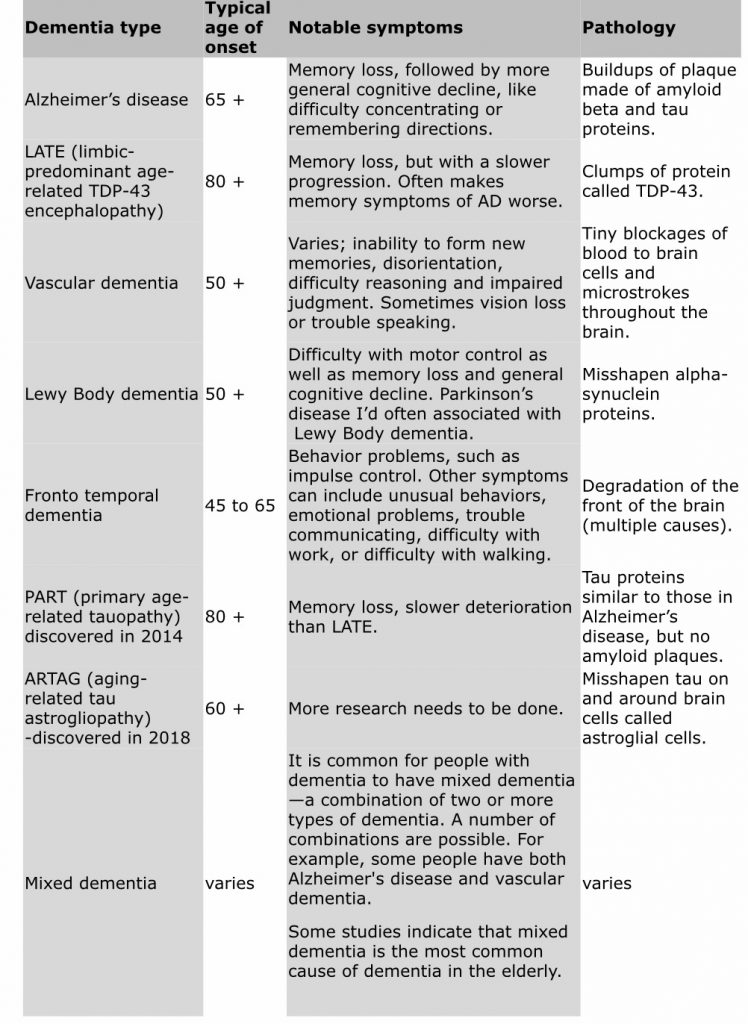
Dementia is an umbrella term used to refer to many types of neurodegenerative diseases—one of which is Alzheimer’s. And while the majority of dementias are diagnosed as Alzheimer’s, a recent study showed that thousands of people diagnosed with Alzheimer’s actually didn’t have the disease.
LATE Can Often be Confused for Alzheimer’s Disease
Some people who have been diagnosed with Alzheimer’s may actually have a newly defined type of dementia that mimics the disease’s symptoms but is caused by another mechanism in the brain. In April 2019, a research team led by scientists at the University of Kentucky discovered yet another condition that causes dementia. They call it LATE, or limbic-predominant age-related TDP-43 encephalopathy.
These are some of the things we know about LATE:
- LATE causes memory loss, but its symptoms tend to progress more slowly than Alzheimer’s;
- LATE only shows up in adults over 80 years old;
- The pathology that causes LATE is completely different than what causes other forms of dementia. Rather than buildups of the plaques and proteins that are characteristic of Alzheimer’s disease, LATE results in other proteins called TDP-43 in three areas of the brain.
- Autopsy studies suggest that LATE may occur in as many as 25% of adults over age 80;
- The disease itself didn’t come out of the blue. The evidence has been building for years, including reports of patients who didn’t quite fit the mold for known types of dementia, such as Alzheimer’s.
- Experts say some clinical trials may have failed as a result of some patients having unidentified LATE and therefore not responding to treatment.
According to Nina Silverberg, Ph.D., director of the Alzheimer’s Disease Centers Program at the National Institute on Aging, “(r)ecent research and clinical trials in Alzheimer’s disease have taught us two things: First, not all of the people we thought had Alzheimer’s have it; second, it is very important to understand the other contributors to dementia.”
LATE Compared with Other Forms of Dementia
Dementia is any condition that impairs a person’s cognitive functions, including memory, behavior, and decision-making, to the point that it interferes with everyday life. Over the years, scientists have learned that there are several different causes of dementia, most of which are the result of an abnormal buildup of certain proteins. Here is a list of different types of dementia, including LATE, the typical dates of onset, symptoms, and pathology:

*Sources: Quartz and NIH
For more information about the different types of dementia, visit https://www.nia.nih.gov/health/what-dementia.
Benefits of Early Diagnosis
Are you or a loved one suffering from symptoms of dementia? If so, early diagnosis is essential. Once people find out that they have a form of dementia, they may be able to take advantage of the benefits to early diagnosis, even though no treatment or cure currently exists. For instance, those who learn that they have an early stage of one of the forms of dementia described above could enroll in clinical trials testing possible new treatments. Another potential benefit could be that it will help those with dementia work with their family, caregivers, and an experienced elder law attorney, such as myself, to plan for their future and their loved ones.
Medicaid Planning for LATE and Other Types of Dementia
Dementia is the most challenging health and social care challenge of our generation, and a diagnosis of the disease is always life-changing. When it comes to legal planning for long-term care, generally the earlier someone with dementia plans, the better the result. But it is important to know that it’s never too late to begin the process of Long-term Care Planning, also called Life Care Planning and Medicaid Asset Protection Planning.
Medicaid planning can even be started by an adult child acting as agent under a properly-drafted Power of Attorney, and even if your loved one is already in a nursing home or receiving other long-term care services. If you have a loved one who is suffering from any type of dementia, please feel free to call us for an initial consultation:
Medicaid Planning Fairfax: 703-691-1888
Medicaid Planning Fredericksburg: 540-479-1435
Medicaid Planning Rockville: 301-519-8041
Medicaid Planning DC: 202-587-2797
















Leave a comment
You must be logged in to post a comment.